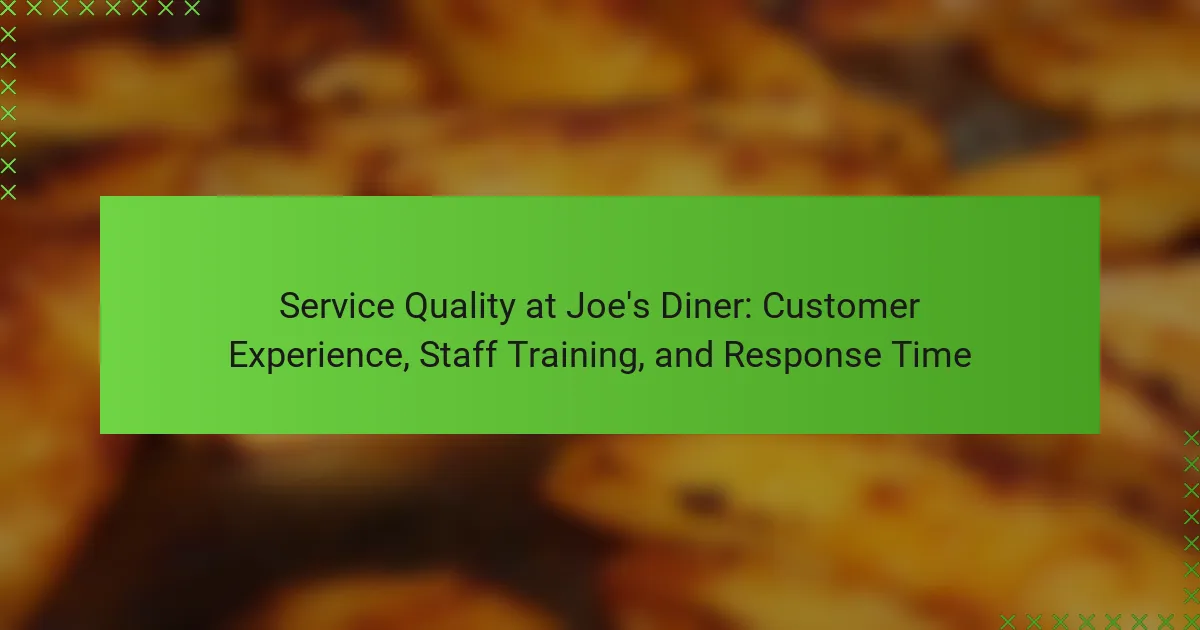
What is Service Quality at Joe’s Diner?
Service quality at Joe’s Diner is characterized by prompt service, friendly staff, and consistent food quality. Customers often report a positive dining experience due to the attentive nature of the staff. Staff training emphasizes customer engagement and efficient order handling. Response time for customer inquiries and complaints is typically quick. Feedback from patrons highlights the importance of these factors in their overall satisfaction. Consistent positive reviews reinforce the diner’s commitment to maintaining high service standards.
How is customer experience defined in the context of Joe’s Diner?
Customer experience at Joe’s Diner is defined as the overall interaction and satisfaction a customer has during their visit. This includes the quality of food, service efficiency, and atmosphere. Staff training plays a crucial role in enhancing customer experience. Well-trained staff provide timely service and engage positively with customers. The diner aims to create a welcoming environment that fosters repeat visits. Customer feedback is actively sought to improve service quality. This approach ensures that the diner meets customer expectations consistently. The emphasis on staff training and response time directly impacts customer satisfaction levels.
What factors contribute to a positive customer experience at Joe’s Diner?
Factors contributing to a positive customer experience at Joe’s Diner include friendly service, quality food, and a clean environment. Friendly service enhances customer satisfaction and encourages repeat visits. Quality food meets customer expectations and drives positive reviews. A clean environment ensures comfort and safety for diners. Additionally, prompt service reduces wait times, which customers appreciate. Staff training improves service consistency and customer interaction. These factors combined create an enjoyable dining experience, leading to customer loyalty.
How does customer feedback influence service quality at Joe’s Diner?
Customer feedback directly influences service quality at Joe’s Diner by identifying areas for improvement. It provides insights into customer satisfaction and preferences. Joe’s Diner uses this feedback to adjust menu offerings and service protocols. This responsiveness enhances the overall dining experience. Regular analysis of feedback helps in staff training initiatives. It ensures employees are equipped to meet customer expectations. Studies show that businesses that prioritize customer feedback see improved service ratings. Joe’s Diner exemplifies this by actively engaging with patrons to refine their services.
Why is staff training important for service quality at Joe’s Diner?
Staff training is crucial for service quality at Joe’s Diner because it directly impacts customer satisfaction. Well-trained staff deliver consistent and efficient service. This consistency fosters a positive dining experience. Training also equips employees with essential skills and knowledge. For example, understanding menu items enhances customer interactions. Additionally, trained staff can handle customer complaints effectively. Research shows that businesses with trained staff see a 20% increase in customer retention. Therefore, investing in staff training is essential for maintaining high service standards at Joe’s Diner.
What specific training programs are implemented at Joe’s Diner?
Joe’s Diner implements several specific training programs. These programs include customer service training, food safety certification, and teamwork workshops. Customer service training focuses on effective communication and handling customer inquiries. Food safety certification ensures all staff understand health regulations and proper food handling techniques. Teamwork workshops promote collaboration among staff members to enhance service efficiency. Each program is designed to improve staff skills and elevate the overall customer experience.
How does ongoing training impact staff performance and service quality?
Ongoing training significantly enhances staff performance and service quality. It equips employees with updated skills and knowledge, leading to improved efficiency. Trained staff are more confident in their roles, which translates to better customer interactions. For instance, a study by the American Society for Training and Development found that companies investing in training see a 24% higher profit margin than those who do not. Additionally, ongoing training fosters a culture of continuous improvement, encouraging staff to adapt to changing customer needs. This adaptability is crucial in the fast-paced environment of a diner. Ultimately, better-trained staff result in higher customer satisfaction and loyalty.
What role does response time play in service quality at Joe’s Diner?
Response time is critical to service quality at Joe’s Diner. Quick response times enhance customer satisfaction and loyalty. Customers expect timely service when dining out. Delays can lead to frustration and negative experiences. Studies show that a response time under five minutes significantly improves customer perceptions. Joe’s Diner aims to maintain a response time that meets or exceeds these expectations. Efficient service can lead to repeat business and positive reviews. Overall, response time directly impacts the overall dining experience at Joe’s Diner.
How is response time measured at Joe’s Diner?
Response time at Joe’s Diner is measured by the time taken from when a customer places an order until the order is served. This includes the duration of order preparation and the time taken for staff to deliver the food. Staff tracks this time using a stopwatch or digital timer. Additionally, customer feedback is collected to assess perceived wait times. Regular assessments help improve efficiency in service delivery.
What strategies are used to improve response time for customer requests?
Implementing automation tools is a key strategy to improve response time for customer requests. These tools can streamline the process of handling inquiries. For instance, chatbots can provide immediate responses to common questions. This reduces the workload on staff and speeds up reply times. Training staff to prioritize urgent requests also enhances response efficiency. Regular performance reviews can identify bottlenecks in the process. Additionally, utilizing a ticketing system helps track and manage requests effectively. Research shows that businesses using these strategies can reduce response times by up to 30%.
How do customer experience, staff training, and response time interrelate?
Customer experience, staff training, and response time are interconnected elements that influence overall service quality. A positive customer experience is often a result of well-trained staff who can respond quickly to customer needs. Effective staff training equips employees with the necessary skills to handle various situations, enhancing customer satisfaction. Studies show that businesses with trained staff see a 20% increase in customer satisfaction ratings. Additionally, faster response times lead to happier customers, as 75% of consumers expect a response within six hours. Therefore, investing in staff training improves response times, directly enhancing customer experience.
What are the key indicators of service quality at Joe’s Diner?
Key indicators of service quality at Joe’s Diner include customer satisfaction, staff responsiveness, and food quality. Customer satisfaction is measured through feedback and reviews. High ratings indicate a positive dining experience. Staff responsiveness reflects how quickly and effectively employees address customer needs. Timely service enhances overall satisfaction. Food quality encompasses taste, presentation, and freshness. Consistently high standards in these areas contribute to a positive reputation for Joe’s Diner.
How can these indicators be tracked and analyzed?
Indicators of service quality at Joe’s Diner can be tracked and analyzed through various methods. Customer feedback surveys can provide direct insights into customer experience. Staff performance can be assessed through regular evaluations and training assessments. Response time can be monitored using time-tracking software for order processing. Data analytics tools can aggregate information from these sources for comprehensive analysis. Regularly reviewing this data helps identify trends and areas for improvement. Implementing changes based on findings can enhance overall service quality.
What benchmarks are used to evaluate service quality?
Service quality is evaluated using several benchmarks. Key benchmarks include customer satisfaction scores, response time, and service reliability. Customer satisfaction scores are often measured through surveys and feedback forms. Response time refers to how quickly staff address customer inquiries or issues. Service reliability assesses whether services are consistently delivered as promised. Other benchmarks may include employee performance metrics and service recovery effectiveness. These benchmarks provide a comprehensive view of service quality at establishments like Joe’s Diner.
What best practices can enhance service quality at Joe’s Diner?
Implementing effective staff training can significantly enhance service quality at Joe’s Diner. Training staff on customer service protocols improves interaction quality. Regular workshops can keep staff updated on best practices. Encouraging teamwork among staff fosters a supportive environment. Additionally, soliciting customer feedback helps identify areas for improvement. Quick responses to customer inquiries can boost satisfaction levels. Establishing a clear communication channel between staff and management ensures issues are addressed promptly. These practices collectively enhance the overall dining experience for customers at Joe’s Diner.
How can Joe’s Diner implement customer feedback effectively?
Joe’s Diner can implement customer feedback effectively by establishing a structured feedback collection system. This system should include surveys, comment cards, and digital feedback options. Engaging customers through these channels allows for diverse input. Analyzing the collected feedback is crucial for identifying trends and areas for improvement. Joe’s Diner should prioritize actionable insights from this analysis. Regular staff meetings can be held to discuss feedback outcomes and training needs. Implementing changes based on feedback demonstrates responsiveness and commitment to customer satisfaction. Tracking the impact of these changes helps in assessing effectiveness and refining processes.
What role does team collaboration play in improving service quality?
Team collaboration significantly enhances service quality by fostering effective communication among staff. When team members work together, they share insights and strategies that lead to better customer interactions. Collaboration allows for real-time problem-solving, ensuring that customer needs are met promptly. A study by the Harvard Business Review found that teams with high collaboration levels increase productivity by 25%. This directly correlates with improved service quality as employees are more engaged and responsive. Additionally, collaborative training sessions equip staff with uniform knowledge and skills, further elevating the customer experience at Joe’s Diner.
Service quality at Joe’s Diner is defined by prompt service, friendly staff, and consistent food quality, contributing to a positive customer experience. The article explores how staff training enhances service efficiency and customer interactions, while response time plays a crucial role in overall satisfaction. Key indicators of service quality include customer feedback, staff responsiveness, and food quality, with best practices outlined for continuous improvement. Additionally, the impact of team collaboration and effective feedback implementation on service quality is discussed, highlighting their importance in fostering customer loyalty.
